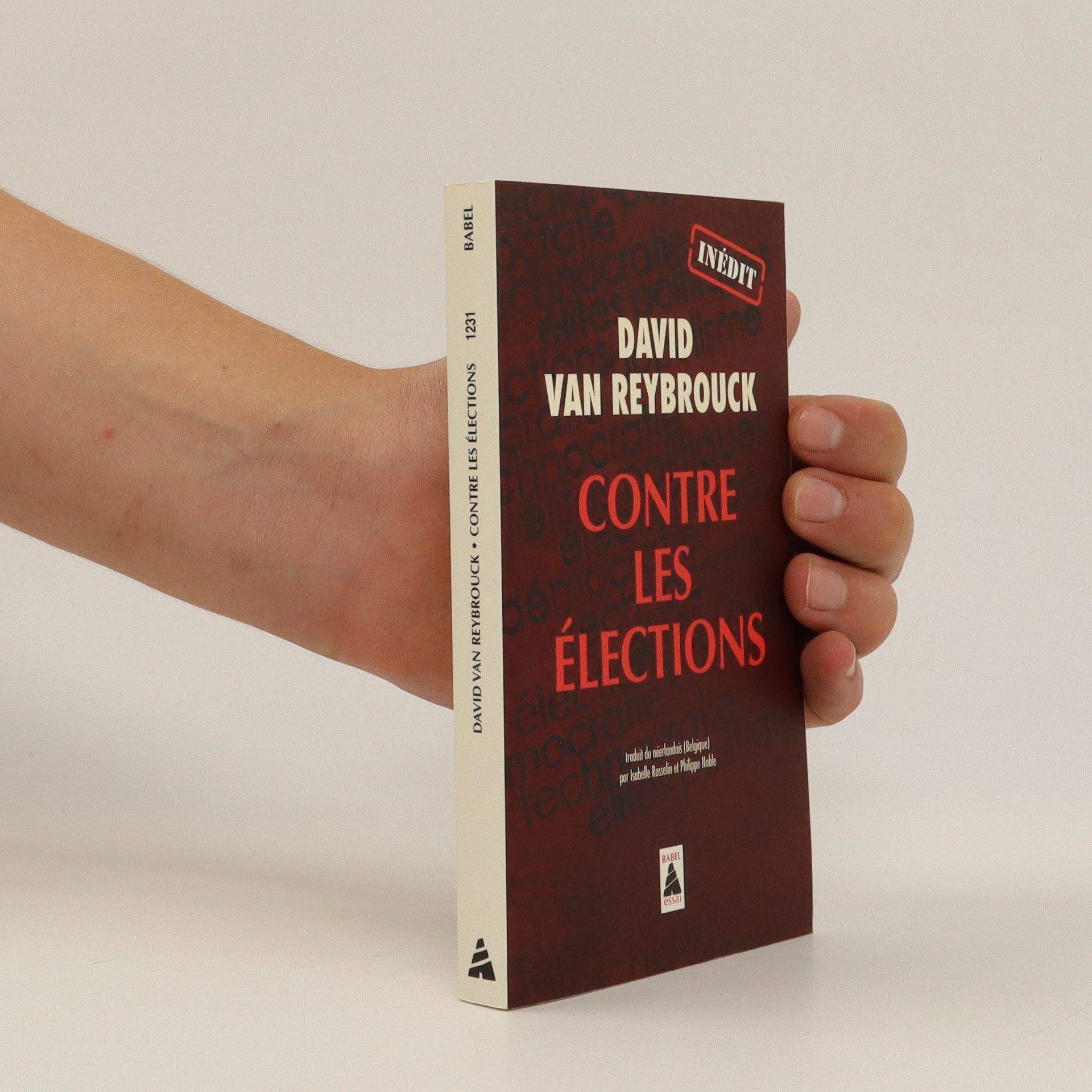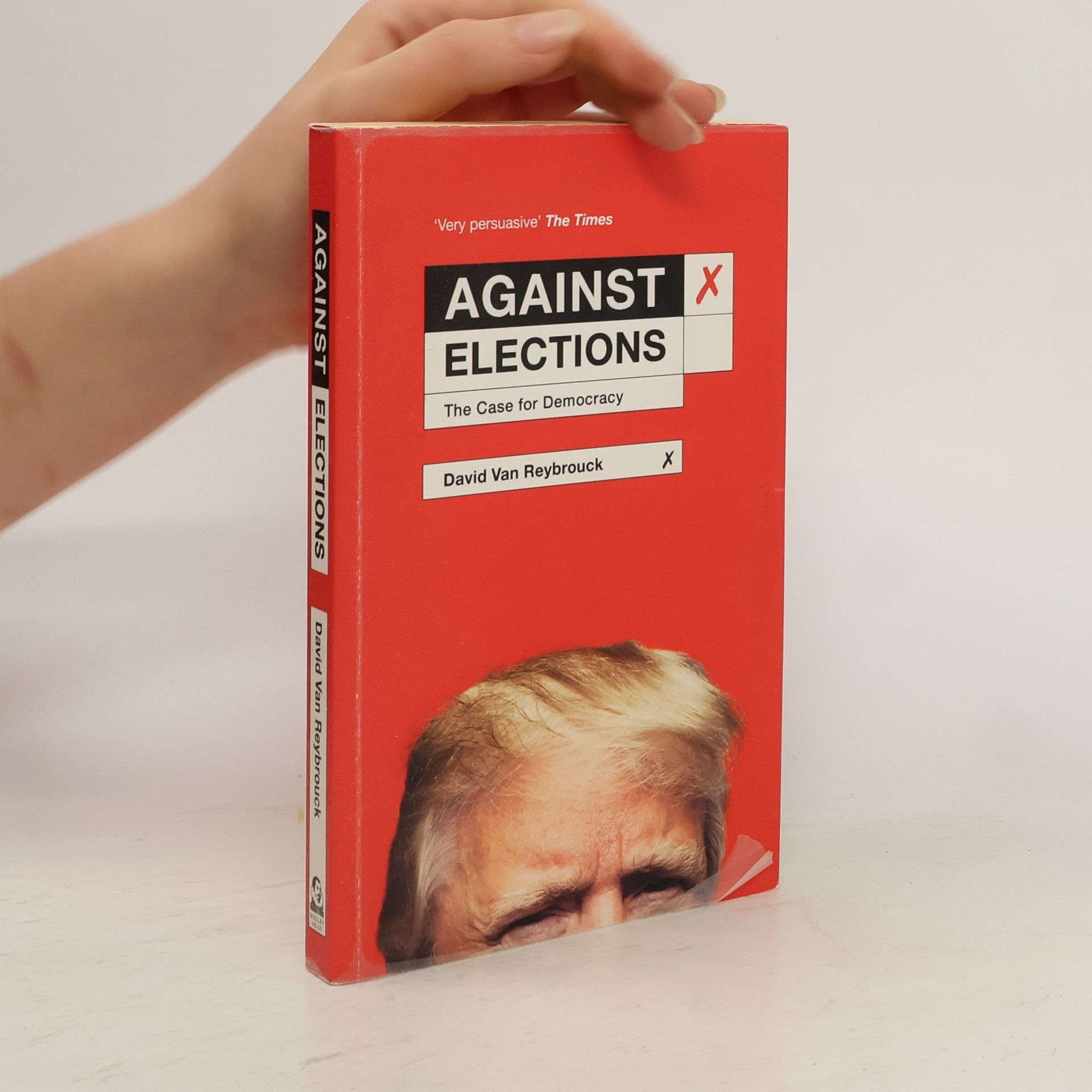Revolusi - L'Indonesia e la nascita del mondo moderno
- 624 pages
- 22 hours of reading
David Van Reybrouck is a Belgian cultural historian, archaeologist, and author whose work spans historical fiction, literary non-fiction, novels, poetry, plays, and academic texts. His writing often reflects a deep engagement with history and cultural heritage, characterized by erudition and narrative skill. He explores themes that bridge the past and present, offering readers unique perspectives on the human experience. His stylistic command and analytical depth make him a significant voice in both literary non-fiction and fiction.






Poème célébrant un personnage ou un événement, parfois poème lyrique destiné à être accompagné de musique : telle est l’ode, selon la définition usuelle.Il n’est donc pas surprenant que David Van Reybrouck ait intitulé ainsi ce livre, tant il s’inscrit sous le signe de la ferveur, de l’enthousiasme, de la beauté et de l’ardeur, de l’amitié et de la gratitude, de la mémoire et de l’histoire. Et toujours dans les parages de la poésie.Musique, peinture, danse, esthétique, philosophie, éthique, littérature mais aussi politique, résistance, résilience ; tout ce qui structure la vie et l’œuvre de cet écrivain engagé, cet historien-archéologue, nous est ici offert en partage.Écrites entre 2015 et 2018, non pas accompagnées de musique mais introduites par un dessin, le geste au crayon d’un artiste en écho aux mots, à la pensée d’un autre, ces odes peuvent aussi être lues comme une série de pas de deux multipliés à l’envi avec ce et ceux qui comptent pour David Van Reybrouck à un instant donné ou pour sa vie entière.«Odes» se lit comme une partition sensible, nourrie du regard que pose sur le monde un humaniste engagé.
Poème célébrant un personnage ou un événement, parfois poème lyrique destiné à être accompagné de musique : telle est l’ode, selon la définition usuelle.Il n’est donc pas surprenant que David Van Reybrouck ait intitulé ainsi ce livre, tant il s’inscrit sous le signe de la ferveur, de l’enthousiasme, de la beauté et de l’ardeur, de l’amitié et de la gratitude, de la mémoire et de l’histoire. Et toujours dans les parages de la poésie.Musique, peinture, danse, esthétique, philosophie, éthique, littérature mais aussi politique, résistance, résilience ; tout ce qui structure la vie et l’œuvre de cet écrivain engagé, cet historien-archéologue, nous est ici offert en partage.Écrites entre 2015 et 2018, non pas accompagnées de musique mais introduites par un dessin, le geste au crayon d’un artiste en écho aux mots, à la pensée d’un autre, ces odes peuvent aussi être lues comme une série de pas de deux multipliés à l’envi avec ce et ceux qui comptent pour David Van Reybrouck à un instant donné ou pour sa vie entière.«Odes» se lit comme une partition sensible, nourrie du regard que pose sur le monde un humaniste engagé.
La democracia está en crisis. Contra las elecciones es una propuesta innovadora que ofrece un diagnóstico inesperado y una solución antigua para evitar que las elecciones socaven la democracia. Las recientes elecciones han evidenciado el auge de populismos basados en el miedo y una creciente desconfianza hacia las élites, transformándose en concursos de popularidad en lugar de un debate razonado. Este libro sostiene que el objetivo original de las elecciones era excluir al pueblo del poder, eligiendo a una élite para que lo gobernara. Durante gran parte de los 3.000 años de historia democrática, los cargos se asignaban mediante sorteos y voluntarios. A partir de estudios y ejemplos globales, se presenta una propuesta real para una democracia auténtica y funcional. Urgente y persuasivo, plantea la pregunta: ¿qué estamos esperando? Las reseñas destacan que el voto popular no ha logrado un gobierno democrático genuino, sugiriendo que ha llegado el momento de reconsiderar esta idea. Se presenta un nuevo sistema diseñado para obtener un sólido respaldo popular y se argumenta que asociar democracia y elecciones es un error. Este libro desafiante y accesible anticipa una idea prometedora para revitalizar la participación democrática.
Ein Plädoyer
David Van Reybrouck thematisiert die Bedeutung demokratischer Partizipation und fordert mehr und besseren Populismus. In einer Zeit, in der Nationalismus zunimmt, wird Populismus oft negativ wahrgenommen, doch in ganz Europa gewinnen populistische Bewegungen an Unterstützung. Van Reybrouck, Historiker und Archäologe, sieht die Ursache in der wachsenden Kluft zwischen Akademikern und Menschen aus bildungsferneren Schichten. Während Akademiker die Vorteile der Globalisierung erkennen und Toleranz für das Fremde einfordern, empfinden viele Menschen in ungelernten Berufen oft Ängste, insbesondere in Bezug auf Konkurrenz. Diese Gruppen sind in Regierungen stark unterrepräsentiert, was fatale Folgen haben kann und sie zu radikalen Positionen treiben könnte. In seiner neuen Schrift fordert Van Reybrouck, dass Demokratie und Regierungsbeteiligung für alle zugänglich sein müssen, insbesondere für jene, die in gesellschaftlichen Debatten oft nicht gehört werden und sich deshalb extremen Parteien zuwenden. Sein Plädoyer ist klar: Populismus sollte nicht gefürchtet, sondern als Werkzeug zur Stärkung der Demokratie genutzt werden.
Democracy is in bad health. This book offers a new diagnosis - and an ancient remedy. It shows that the original purpose of elections was to exclude the people from power by appointing an elite to govern over them. Based on studies and trials from around the globe, it presents the practical case for a true democracy - one that actually works. --Publisher
Wahlen sind ein primitives Instrument mit einer verrückten Logik, die Politiker dazu bringt, unerfüllbare Versprechen zu machen. In der aktuellen Debatte über Demokratie ist es seltsam, dass zwar alle dafür sind, aber viele an ihrer Funktionsfähigkeit durch Wahlen zweifeln. Wenn Wahlergebnisse nicht den Erwartungen entsprechen, wird schnell der Vorwurf des Populismus erhoben. Die Wahlbeteiligung sinkt, und die Mitgliederzahlen politischer Parteien gehen dramatisch zurück. Wie kann eine Demokratie effizient arbeiten und langfristige Entscheidungen treffen, wenn Politiker vor allem darauf aus sind, bei der nächsten Wahl wiedergewählt zu werden? David Van Reybrouck beschreibt diesen Mechanismus als „demokratisches Ermüdungssyndrom“. Um aus dieser Situation herauszukommen, könnten neue Wege erforderlich sein, auch wenn sie zunächst als weltfremd erscheinen. Van Reybrouck greift ein altes demokratisches Prinzip auf, das bereits im antiken Athen praktiziert wurde: das Los. Dieses Verfahren wurde bis zur Französischen Revolution häufig genutzt, etwa in blühenden Republiken wie Venedig oder Florenz während der Renaissance. Er zeigt, wie dieses Prinzip auch heute unsere machtlos gewordene Demokratie wiederbeleben kann.
Notre démocratie représentative est aujourd'hui clans une impasse. Sa légitimité vacille : de moins en moins de gens vont voter, les électeurs font des choix capricieux, le nombre d'adhérents des partis politiques est en baisse. En outre, l'efficacité de la démocratie est violemment mise à mal : toute action énergique de l'exécutif devient problématique, les hommes politiques adaptent de plus en plus leurs stratégies en fonction des échéances électorales. Cet état de fait, David Van Reybrouck l'appelle "le syndrome de fatigue démocratique" et il s'interroge sur les moyens concrets d'y remédier. Suivant les travaux récents de politologues renommés, il préconise de remettre à l'honneur un grand principe de démocratie qui a connu son apogée dans l'Athènes classique : celui du tirage au sort. Au fil d'un exposé fervent et rigoureux, David Van Reybrouck démontre combien ce principe de tirage au sort pourrait être efficace pour donner un nouvel élan à nos démocraties essoufflées. Car il s'agirait bien, en associant des citoyens représentatifs de toutes les strates professionnelles et sociales, de rendre au peuple les moyens d'agir sur ce qui le concerne au premier chef.
FINALIST FOR THE CUNDILL PRIZE FOR HISTORY `Not only deserves the description epic, in its true sense, but the term masterpiece as well' Independent